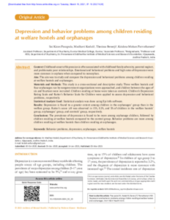Abstract
Context: Childhood-onset of depression is often associated with childhood family adversity, parental neglect, and problematic peer relationships. Emotional and behavioral problems and high rates of depression were more common in orphans when compared to nonorphan.
Aim: The aim was to study and compare the depression and behavioral problems among children residing at welfare hostels and orphanages.
Materials and Methods: This study is a cross-sectional and descriptive study. Three welfare hostels and four orphanages run by nongovernment organizations were approached, and children between the ages of six and fourteen were recruited. Children residing at home were taken as controls. Children's Depression Rating Scale and Rutter's Behavior Scale for Children were applied to assess depression and behavioral problems, respectively.
Statistical Analysis Used: Statistical analysis was done using Epi Info software.
Results: Depression is found to a greater extent among children in the orphanages' group than in the welfare group. Rutter's score ≥9 was observed in 15%, 8.3%, and 5% of children in the welfare hostels' group, orphanages' group, and controls' group, respectively.
Conclusions: The prevalence of depression is found to be more among orphanage children, followed by children residing at welfare hostels compared to the control group. Behavior problems are more among children residing at welfare hostels than children residing at orphanages.

